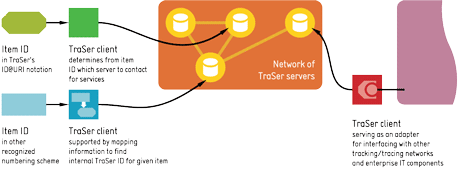by Zsolt Kemény and Elisabeth Ilie-Zudor
A substantial number of the challenges to be tackled by the future Internet are posed by collaborative communities such as supply chains or production networks, where massive amounts of product-related information are shared in a selective and secure manner. One of the key application areas in this domain is tracking and tracing, ie, keeping track of production-related entities of interest and their interaction with identifiable objects in their environment. The international project TraSer Identity-based Tracking and Web Services for SMEs addresses research and development efforts in this area.
Aside from case studies, tutorials and instruction materials, the main output of the project is an entry-level tracking and tracing platform. This has been designed especially for small-scale users in heterogeneous environments such as constantly changing production communities with frequent occasional collaboration actions. As things stand, this user range lies outside the scope of most off-the-shelf solution kits for tracking and tracing of products and product data.
TraSer supports tracking and tracing on the level of individual items (as opposed to the account-based view of purely quantitative stock levels), and relies on Web services for communication. Item-related data are maintained by TraSer servers, which communicate with each other if queries or updates are forwarded or broken down to distributed components. TraSer clients serve as interfaces to the rest of the world, including human operators, automated checkpoints or other components of the given IT infrastructure (Figure 1).

Aside from its focus on small enterprises, a number of features distinguish the TraSer solution from most other comparable frameworks. First, TraSer uses an internal identifier notation (ID@URI), where each unique ID already contains the address of the access point for the related services, thus eliminating the need for a comprehensive lookup service and allowing a decentralized allocation of identifiers. (Note that TraSer can also adapt to unique identifiers in existing numbering schemes by mapping them onto its internal notation in a variety of ways.) The TraSer platform is essentially independent of the physical ID carrier (eg barcode, RFID) and can also be run with purely electronic identifiers for data tracking.
TraSer is also free and open-source, and its implementation relies on a Java-based open-source Web service framework. Publicly available interface specifications will allow users to easily implement their own special building blocks, such as clients tailored to specific purposes, or to reimplement a TraSer solution in a development environment of their choice. This feature is of special importance for small enterprises that act as suppliers in multiple production networks and must conform to multiple communication and track-and-trace specifications.
TraSer offers useful functionalities for handling item-centric data such as advanced search and aggregation support, views of historical data, and backtracking of information. These facilitate special actions such as focused recall campaigns or the location of certain goods in the production chain. At the moment, such actions are still seriously hampered in heterogeneous production networks due to the lack of transparency and commonly accepted interfaces.
TraSer allows a flexible definition of data models and facilitates this with its XQuery-based interfaces, a feature which is of special importance for enterprises of high product variability (as opposed to the majority of todays track-and-trace applications which are optimized for large production volumes and less diversity). Furthermore, users can easily extend or overlay existing product data maintained by other manufacturers, which adds further flexibility and freedom in data model planning.
In addition, a special release of the solution platform was adapted to tracking product data files: not common in commercially available tracking platforms.
With completion planned for June 2009, and approaching the end of its three-year life span, the TraSer project has now advanced to the stage of pilot implementations representing various targeted user groups. These were selected in order to provide useful practical feedback about industrial needs that were, in part, unknown even to the users in question. Performed at various research institutions, small enterprises and logistics service providers, the key emphasis of implementation pilots dealt with following cases:
- tracking of product data in design, prototyping and procurement processes
- tracking of product delivery in collaboration with small enterprises, using a minimum of IT resources
- closed-circuit tracking of reusable equipment in research facilities
- closed-circuit tracking of the transportation assets of a country-wide logistics service provider and offering goods-tracking services for customers.
Upon termination of the project, an industry-ripe release of the solution platform will be available for free download, along with accompanying material such as tutorials, instructions, case studies and educational material for prospective users entirely new to the concept of tracking and tracing. Further information can be obtained at the official project Web site or by contacting the project representatives.
Link:
http://www.traser-project.eu/
Please contact:
Elisabeth Ilie-Zudor; Zsolt Kemény
SZTAKI, Hungary
Tel: +36 1 279 6195
E-mail:
kemeny![]() sztaki.hu
sztaki.hu










